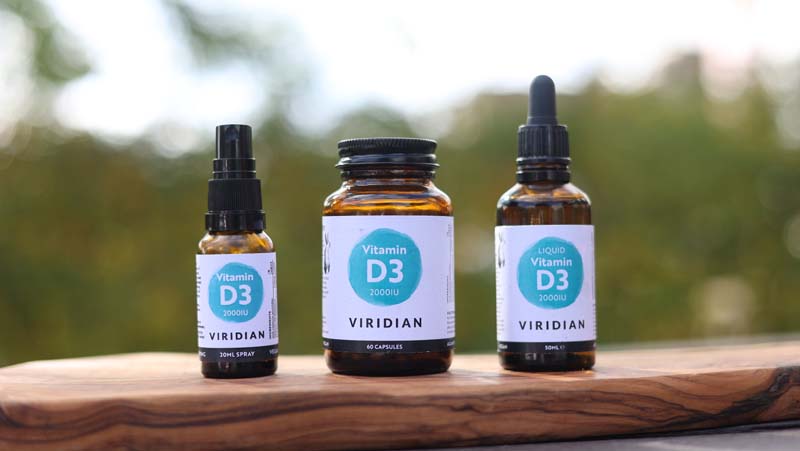
The menopause is a natural stage following the end of a woman’s reproductive years, and it is likely that each person will experience different range of symptoms. From hot flushes, low mood, night sweats to interrupted sleep, studies have shown how nutrition can positively support women during these changes. We explore the nutrients that can assist your body through the menopause.
Menopause
Perimenopause can be as early as the age of 40, which is the start of the menopause however woman may still have sporadic cycles for up to 10 years before they fully cease. Menopause is the cessation of sex hormone production, specifically the reduction of oestrogen production, and lowered progesterone production.
This period is often associated with additional symptoms, which may include, menstrual cycle disruption which can be prolonged or irregular and often may be associated with hot flushes, unexplained bloating, headache or migraine, or dizziness, besides low mood, fatigue or feelings of irritation and tension. Each and all of which can affect quality of life. The NHS estimate that eight in 10 women will be symptomatic which can last for up to four years after the end of menstruation.
The diagnosis
Menopause is confirmed upon 12 months since the last menstrual cycle. However, perimenopause can be experienced for up to 10 years prior to a confirmed menopause.
At the most, this can affect the lives of women for up to 14 years, which can have a huge impact on quality of life, mood, and health. As well as conventional treatment such as hormone replacement therapy, help may be at hand in the guise of some well-known herbs, an Andean root vegetable, essential fatty acids, and a well-known mineral besides some dietary tweaks.
Top 5 Nutrients to help with your body’s transition
Magnesium is involved in over 300 body processes which include hormone production. It can be useful to check your diet for magnesium containing foods, such as leafy greens, avocado, nuts, and seeds. And if they are few and far between a few tweaks and possibly a food supplement can help to optimize your magnesium status. Research reported that magnesium with vitamin B6 gave relief to anxiety-related premenstrual symptoms that are also experienced during menopause, such as nervous tension, mood swings, irritability, or anxiety. Additionally, it is well recognised by the Migraine Trust that magnesium may offer relief from migraines, this evidence is supported by research which showed a reduction in pain severity of migraine plus other menstrual symptoms in response to magnesium.
Essential fatty acids are dietary fats. Our body needs a good balance of omega 6 and omega 3 essential fatty acids, which are termed ‘essential’ as the body cannot produce them and so, must consume them. It is commonplace for the western diet to contain more omega 6 fatty acids in processed foods made with vegetable oils and packaged snacks, however a healthy beneficial ratio of 2:1 omega 6 to omega 3 fatty acids is considered the best balance to support your body’s needs.
How is this linked to the menopause, you may ask? Oestrogen is known to exert an anti-inflammatory effect, subsequently, menopause can be considered inflammatory in response to the reduction of oestrogen production. This altered management of the inflammatory cascade may contribute to menopausal symptoms, especially tension, anxiety, mood, and fatigue. Omega 3 fatty acids are associated with lower levels of inflammation and with improved cellular structure. Omega 3 food supplements are either fish oils or marine alga, where just one teaspoon can provide the perfect dose, and also available as an omega 3 rich seed oils.
Sage is an age-old remedy for menopausal symptoms, commonly used by herbalists. The usefulness of sage in countering menopausal symptoms is attributed to its phytoestrogen content. Phytoestrogens are plant derived non-steroidal oestrogens that are far milder than human derived oestrogen. Therefore, phytoestrogens during and after menopause is considered to buffer the symptoms of menopause. A recent study confirmed these considerations, it reported improved menopausal symptoms such as flushing, night sweat, heart palpitations, muscle and joint pain, depression, anxiety, sleep disorders, and sexual desire in response to sage extract.
Red clover, another traditional herb, was frequently used by herbalists to address menopause symptoms. But what makes red clover so special is that its beneficial effects are not just attributable to the phytoestrogen content but also to the isoflavone irilone. These compounds are considered to buffer both oestrogen and progesterone. A review of studies published in 2014 combined the findings from 11 research trials to conclude that red clover had a positive effect on hot flushes and a small, beneficial change on hormones.
Maca root is a parsnip-like root vegetable that grows in several colours in the Andes within Peru, with the best grown at conditions of 4,000-4,500 metres altitude. Maca has historical native use for energy and stamina, however in recent times it is used as an adaptogen to support the stress response. Researchers suggest that maca may support the brain signalling which services the stress response and sex hormone production, which in turn may improve perimenopausal symptoms. This is supported by a two-month intervention trial which reported a reduction in body weight, blood pressure, was supportive of balanced hormones and alleviated negative physiological and psychological symptoms, such as, the frequency of hot flushes, incidence in night sweating, interrupted sleep pattern, nervousness, depression, and heart palpitations in perimenopausal women.
Lifestyle
Making changes to your diet and nutritional intake can help with the transition, however it is also important to support this with lifestyle adaptions. For instance, the change in hormones may put additional load on the liver, therefore it would be worthwhile considering reducing your alcohol consumption. Additionally, swapping out personal and cleaning products for those that are chemical free and natural will reduce toxin exposures and ultimately reduce the load that the liver must process to efficiently detoxify the body.
Menopause is a physical stressor and so stress management techniques may also be useful, such as mindfulness, walking in nature, yoga, reading or meditation.
Consider introducing a sleep practice which starts 90 minutes prior to your desired sleep time. Sleep during both peri- and menopause can be disrupted so minimizing the risk of disruption can be useful. Ensure you have a quiet, dark and cool bedroom, while reducing your exposure to blue back lit screens and running a bath can help you to unwind and encourage sleep.
In terms of dietary and lifestyle changes there can be a lot to implement. However, start with just one or two items and over a period of weeks slowly implement additional factors so as not to become overwhelmed or guilt ridden if you forget an item.
Conclusion
Overall, a few dietary and lifestyle tweaks should offer some reprieve from menopausal symptoms. Especially if you choose one of the suggested food supplements.
- Magnesium
- Omega-3 essential fatty acids
- Sage
- Red Clover
- Maca
Look for high quality food supplements which provide 100% nutrition and are free from additives, sugar and bulking or flow agents. Botanicals such as sage, red clover and maca are available certified organic, as is fish oil from organic river fish. To discuss your personal food supplement requirements, contact your nearest local health food stores by visiting www.findahealthstore.com
Author: Jenny Carson is a Nutritional Practitioner and Technical Services Manager at Viridian Nutrition. She holds a BSc honours degree in Nutritional Science and is a Master of Research (MRes) in Public Health.
References
De Souza MC, Walker AF, Robinson PA, Bolland K. A synergistic effect of a daily supplement for 1 month of 200 mg magnesium plus 50 mg vitamin B6 for the relief of anxiety-related premenstrual symptoms: a randomized, double-blind, crossover study. J Womens Health Gend Based Med. 2000 Mar;9(2):131-9. doi: 10.1089/152460900318623. PMID: 10746516.
Facchinetti F, Sances G, Borella P, Genazzani AR, Nappi G. Magnesium prophylaxis of menstrual migraine: effects on intracellular magnesium. Headache. 1991 May;31(5):298-301. doi: 10.1111/j.1526-4610.1991.hed3105298.x. PMID: 1860787.
Fathizadeh N, Ebrahimi E, Valiani M, Tavakoli N, Yar MH. Evaluating the effect of magnesium and magnesium plus vitamin B6 supplement on the severity of premenstrual syndrome. Iran J Nurs Midwifery Res. 2010 Dec;15(Suppl 1):401-5. PMID: 22069417; PMCID: PMC3208934.
Ghazanfarpour, M., Sadeghi, R., Latifnejad Roudsari, R., Mirzaii Najmabadi, K., Mousavi Bazaz, M., Abdolahian, S., & Khadivzadeh, T. (2015). Effects of red clover on hot flash and circulating hormone concentrations in menopausal women: a systematic review and meta-analysis. Avicenna journal of phytomedicine, 5(6), 498–511.
Meissner, H O et al. “Therapeutic Effects of Pre-Gelatinized Maca (Lepidium Peruvianum Chacon) used as a Non-Hormonal Alternative to HRT in Perimenopausal Women - Clinical Pilot Study.” International journal of biomedical science: IJBS vol. 2,2 (2006): 143-59.
Zeidabadi, A., Yazdanpanahi, Z., Dabbaghmanesh, M. H., Sasani, M. R., Emamghoreishi, M., & Akbarzadeh, M. (2020). The effect of Salvia officinalis extract on symptoms of flushing, night sweat, sleep disorders, and score of forgetfulness in postmenopausal women. Journal of family medicine and primary care, 9(2), 1086–1092. https://doi.org/10.4103/jfmpc.jfmpc_913_19
This article is for information purposes and does not refer to any individual products. The information contained in this article is not intended to treat, diagnose or replace the advice of a health practitioner. Please consult a qualified health practitioner if you have a pre-existing health condition or are currently taking medication. Food supplements should not be used as a substitute for a varied and balanced diet.







